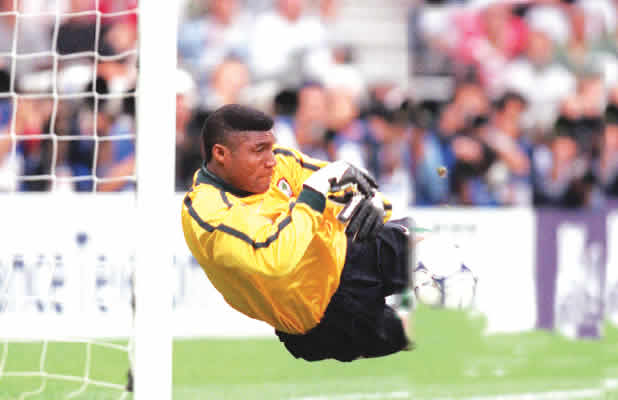Peter Rufai, a celebrated legend in Nigerian football, reflected on his notable career with the Super Eagles in a recent interview. Known for his commanding presence as a goalkeeper, Rufai fondly recalls the moments spent rallying his teammates, particularly the strikers. He emphasized the unique dual role of a goalkeeper, explaining how he needed to communicate directions to forwards like Samson Siasia due to the vast distance on the pitch. Rufai highlighted that this aspect of goalkeeping, fostering awareness and positioning among attackers, is often overlooked but is crucial for maintaining team cohesion during a match.
Rufai’s experiences in football encapsulate a journey filled with challenges and triumphs. He likened the ups and downs of the sport to life itself, underscoring the necessity of resilience. Throughout his time with the Super Eagles, he faced numerous adversities that tested the team’s resolve. One prominent achievement was overcoming intense competition on the pitch, often facing well-prepared opponents. He recalled how, despite rigorous training and strategic planning under coach Clemens Westerhof, the Super Eagles sometimes struggled. However, the tenacity and perseverance of the team eventually led to successful outcomes, showcasing their ability to adapt and overcome obstacles.
One particular episode that marked Rufai’s career was his struggle to balance club responsibilities and national duties. After signing with Belgian club Lokeren, he faced a dilemma when called up to represent Nigeria, as contractual obligations demanded his return within 24 hours post-match. Logistical failures prevented him from leaving Nigeria, leading to the loss of his starting position in Belgium and rumors about his commitment to football. This situation propelled Rufai to seek further education, ultimately earning a Master’s Degree in Business Administration, an endeavor he pursued to rebuild his career both on and off the pitch despite the setbacks he faced.
Rufai faced significant challenges professionally as well, with the 1994 Africa Cup of Nations (AFCON) serving as a pivotal moment in his career. Initially left out of the national team, he received overwhelming public support from Nigerians who rallied for his inclusion. The groundswell of popular demand prompted football authorities in Nigeria to select him for the tournament. Wearing the number 22 jersey instead of his usual number 1, Rufai rose to the occasion, ultimately helping Nigeria secure their second Nations Cup title. This experience not only awakened Rufai to the deep affection Nigerians had for him but also cemented his legacy as a symbol of national pride and resilience.
Looking at the present Super Eagles, Rufai expresses cautious optimism as Nigerian football strives to regain its former glory. He commends the efforts of the current Nigeria Football Federation (NFF) President Ibrahim Gusau, who is actively working to bring together various stakeholders in the sport to achieve better outcomes. Rufai’s insights reflect a belief in the progress being made within Nigerian football, emphasizing the importance of unity and collective effort in realizing ambitious sporting goals.
In a broader context, Rufai considers Nigeria’s greatest achievements in sports, showcasing the nation’s rich history of successes, such as multiple African Cup of Nations titles and triumphs at the 1996 Olympics. However, he points out that the elusive World Cup title continues to be a point of contention for Nigerian football. He also expresses pride in the accomplishments of Nigeria’s Paralympics team and the ongoing efforts by sports authorities to address various challenges faced across different sports sectors. Rufai concludes with a hopeful perspective, believing that with sustained hard work and dedication, Nigeria can one day attain its aspirations on the global sporting stage.


